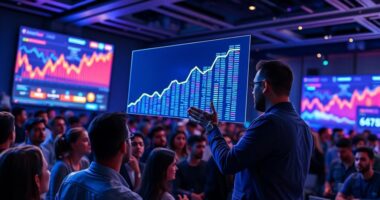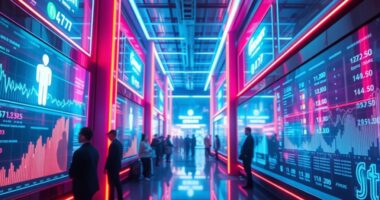Both data science and artificial intelligence are experiencing rapid growth, creating many opportunities across industries. Data science focuses on analyzing data to generate insights that inform decisions, while AI develops systems that perform tasks requiring human-like cognition. AI’s demand is increasing faster and often offers higher salaries, especially with advanced technologies like generative models. If you stay updated on the latest trends and develop skills in both areas, you’ll be well-positioned to capitalize on these expanding fields.
Key Takeaways
- AI’s rapid deployment across industries is driving faster growth and higher salaries compared to traditional data science roles.
- Data science remains essential for strategic insights, with steady demand in analytics, reporting, and decision-making.
- AI’s expanding applications in automation, robotics, and real-time systems offer greater long-term career opportunities.
- Both fields require strong technical skills; AI often demands expertise in advanced frameworks like TensorFlow and PyTorch.
- Industry investments favor AI development, making it a more rapidly evolving and potentially lucrative career path.

Data science and artificial intelligence (AI) are closely related fields that often overlap but serve distinct purposes. As you explore these areas, you’ll find that data science primarily focuses on extracting meaningful insights from various types of data—whether structured or unstructured—to support informed decisions and strategic planning. Your goal as a data scientist is to gather, clean, analyze, visualize, and interpret data, turning raw information into actionable intelligence that guides business operations. In contrast, AI aims to develop intelligent systems capable of performing tasks that usually require human cognition, such as reasoning, problem-solving, and decision-making. These systems are built through designing algorithms that enable machines to learn from data, make predictions, and operate autonomously. Machine learning, a subset of AI, bridges the gap by creating models that improve over time as they process more data, making these fields interconnected yet distinct.
When it comes to application domains, your work in data science often revolves around fraud detection, healthcare analytics, market forecasting, and understanding customer behavior. These insights help refine strategies and optimize processes. AI, on the other hand, powers interactive technologies like chatbots, voice assistants, robotics, and autonomous vehicles, pushing the boundaries of automation. Machine learning fuels recommendation engines, facial recognition, search algorithms, and real-time health monitoring, enabling systems that adapt and improve without human intervention. Your task in data science is to generate insights that directly influence decision-makers, while AI builds systems that engage users and make real-time decisions, often without explicit human oversight. High refresh rates in AI-driven gaming applications enhance user experiences and provide immersive interactions.
The technical skills you need vary based on your focus. As a data scientist, you’ll require expertise in mathematics, statistics, database management, and data visualization tools such as Tableau or Hadoop. Your programming skills in Python or R are essential for analysis and model development. If you pursue AI, you’ll need a solid foundation in mathematics, programming languages like Python, R, Java, or C++, and familiarity with frameworks such as TensorFlow or PyTorch. Both fields rely heavily on machine learning techniques, but your emphasis will differ—data science leans toward analysis and visualization, while AI emphasizes creating scalable, intelligent systems. The demand for AI skills is growing rapidly, with industries investing heavily in research and deployment of AI solutions. This trend underscores the importance of developing expertise in both areas to stay competitive.
Market trends reflect these differences. AI roles often command a higher salary due to the scarcity of specialized skills like those needed for Generative AI and large language models. Your work in AI is increasingly turning from experimental projects into operational systems, making your skills crucial for deploying business-critical solutions. Meanwhile, data science remains essential for decision support, with careers centered on predictive analytics and embedding models into business intelligence tools. Although both fields share foundational knowledge and programming languages, their distinct focus areas mean you’ll find unique opportunities and challenges in each, shaping your career trajectory based on your interests and skill set.
Frequently Asked Questions
How Do Job Roles Differ Between Data Science and AI?
You’ll find data scientists focus on identifying business problems, collecting and cleaning data, and building models to generate insights. AI engineers, on the other hand, develop and deploy intelligent algorithms, creating scalable systems and infrastructure. While data scientists interpret data and communicate findings, AI engineers handle system design, deployment, and real-time processing. Your role depends on whether you prefer data analysis and strategic insights or engineering intelligent, autonomous systems.
What Industries Are Adopting Data Science Versus AI Solutions?
You’ll find data science solutions mainly in healthcare, finance, retail, cybersecurity, and oil and gas, where they optimize operations, analyze complex data, and improve decision-making. On the other hand, industries like manufacturing, customer service, logistics, telecom, and financial services are adopting AI for automation, predictive maintenance, customer experience, and real-time process optimization. Many sectors, including healthcare and retail, are integrating both to maximize efficiency and innovation.
Which Skill Sets Are Most Valuable for Each Field?
Think of data science skills as the keys to a well-organized toolbox—you need programming, statistical analysis, data manipulation, and communication to access insights. For AI, the tools are deeper: neural networks, machine learning frameworks, and mathematical foundations. Both fields value problem-solving and collaboration. If you master programming and analytics, you’re building a sturdy bridge—whether to extract insights or develop intelligent systems.
How Do Educational Pathways Vary for Data Science and AI Careers?
You’ll find that educational pathways for data science and AI careers differ mainly in prerequisites and focus areas. Data science programs emphasize statistics, calculus, and programming with Python and SQL, often requiring a master’s degree. AI pathways demand deeper knowledge in machine learning, neural networks, and advanced math like linear algebra and calculus, with coursework including robotics and NLP. Both fields value strong technical skills and relevant research or project experience.
What Are the Ethical Considerations Unique to AI Compared to Data Science?
You need to prioritize ethical considerations like bias, transparency, and privacy when working with AI. Unlike data science, AI’s black-box nature makes bias harder to detect and address, risking discriminatory outcomes. Additionally, AI’s autonomous decision-making complicates accountability and transparency. You must guarantee responsible development by actively mitigating bias, safeguarding privacy, and establishing clear accountability, especially given AI’s potential for large-scale, impactful deployment that can affect human rights and societal trust.
Conclusion
As you explore the worlds of data science and artificial intelligence, remember that over 80% of companies now rely on AI to drive decisions. Imagine the potential—your skills could shape innovations impacting millions. Whether you choose to analyze data or develop intelligent systems, the growth opportunities are vast. Embrace the challenge, stay curious, and you’ll be at the forefront of a technology revolution that’s transforming every industry around you.









